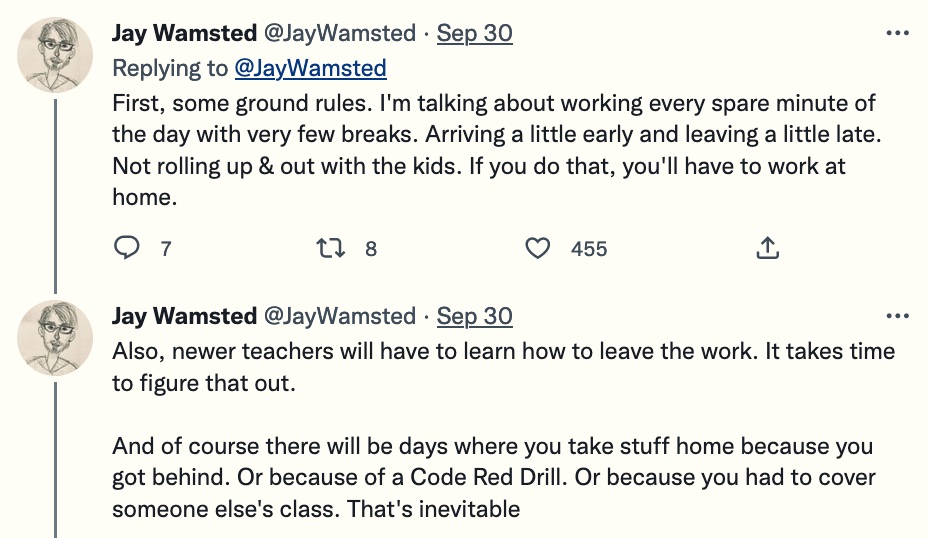This interview with teacher Jay Wamsted originally appeared here in November of 2022. I’ve never updated and republished a column before, but as I was re-reading this post recently I had a visceral reaction to it – a strong feeling of need (“we need to keep hearing this message as teachers, especially now”), and a strong feeling of, well, panic (“how on earth are teachers going to keep healthy boundaries and still combat the coming challenges of the next four years?”).
There’s excellent, thought-provoking advice in this post which (sadly) remains highly relevant. I’ve also asked Jay to add some “2025” thoughts, which I’ve included at the bottom. – Dina
A MiddleWeb Blog
 As I interview Jay Wamsted, 8th grade Math teacher, on a cell phone call, he apologizes to me profusely about the leaf-blowers along his walking route after school. “They’re everywhere,” he says.
As I interview Jay Wamsted, 8th grade Math teacher, on a cell phone call, he apologizes to me profusely about the leaf-blowers along his walking route after school. “They’re everywhere,” he says.
There’s several metaphors to be had here: about speaking up against constant noise, perhaps, or about the importance to teachers of heading for home, above almost all else.
Jay championed these ideas in a viral Twitter thread this past September on why, and how, teachers should leave their school work solely in the building. His wide-ranging suggestions include protecting the personal lives of teachers, abolishing homework, and recognizing that a “calling” is ripe for systemic exploitation.
 Jay views our current moment in teaching as a perfect storm of pandemic fallout, growing intolerance of the huge fiscal inequities of American society, and baseline overburdening of the caring professions. It is one which requires a strong corrective: “We must let things lie on the table, unfinished. That is the only way to change the system,” he writes in the thread.
Jay views our current moment in teaching as a perfect storm of pandemic fallout, growing intolerance of the huge fiscal inequities of American society, and baseline overburdening of the caring professions. It is one which requires a strong corrective: “We must let things lie on the table, unfinished. That is the only way to change the system,” he writes in the thread.
“How is this like ‘quiet quitting’?” I asked.
Jay balks a bit at this choice of terms, and understandably so, as he himself is anything but a quitter: a runner, Ph.D., teacher for almost two decades, and father of four. “I wouldn’t call it quitting. But there is an element of protest in this,” he says. “I had a principal tell all of us once that if we were not staying for hours after school, and coming in on Saturdays, we shouldn’t even be teachers. But the system will take and take and take. The system does not care if you stay on Saturdays.”
Nor does the system’s administrators survive their own stated work ethic, he notes wryly. “And how fast does admin turn over these days, after all? My fourth principal in four years isn’t even going to know I came in on Saturdays.”
The response to his thread has been predictably mixed, but not in the ways you might think. “Maybe… 50% positive, 50% negative?” Jay muses. “With 50% of that negative 50% being, you know, troll-like. I want to engage with the teacher-driven negative 50%, the teachers who are saying, ‘No no no, that’s not what we should do,’ rather than other people saying ‘You have terrific health insurance, shut up, you’re just lazy.’”
It’s the teacher-driven resistance to Jay’s ideas where he spends the most time in the thread, debunking the myths we tell ourselves about owing the kids, the need for self-sacrifice, and the imperative of service.
“The caring professions, women’s work in particular, capitalize on our caring. You might say that professionals always put their work first like this, but the fact is that professionals DON’T always do this. And if they DO, they’re being compensated for their time with adequate pay,” he notes.
“I have 17 years of experience and a Ph.D.. I still make five figures. Find me another ‘professional’ with similar qualifications who makes so little. I’m not whining about pay, but don’t compare my work to the median salary of an architect in New Mexico. I’m not having that conversation,” he laughs. “The care and feeding of people is demonstrably underpaid in this country.”
Jay’s voice also represents those of us teachers (full transparency: I’m 50 years old) who are not young and childless. “The model of burning out 23 year olds is a model, but it’s a bad one. I’m not throwing the 23 year olds under the bus– they are wonderful colleagues,” he says. “But with a marriage and a family, I simply don’t have huge swaths of time to devote to teaching in the same way.”
Longevity in teaching also has benefits we teachers joke about, but are demonstrably true: “I didn’t learn to be a good teacher until 5 or 6 years in, honestly,” Jay says. He returns to the metaphor of “quiet quitting” now, something that’s obviously been rumbling around in his thoughts since we began discussing it. “No, It’s not quiet quitting. It’s… quiet running a marathon. Do you finish a marathon if you cramp out at mile three?
“The ultimate question is: what is the best for our kids? What do they deserve? Don’t they deserve a teacher with 20 years of experience and a good home life too? I want to be here for them this year, and the next, and the next. Our kids need veterans, not martyrs.”
Jay’s reached home now; I can hear him opening his front door and greeting his children. We thank each other and say goodbye. It’s time to stop talking about school.
February 2025 Coda from Jay Wamsted
“How on earth are we going to keep healthy boundaries?”
Just past the midpoint of my 19th year of teaching, about to sign a contract for my 20th, I now know that there is only one answer to Dina’s question: we have to fight for our boundaries.
We work in a profession where any pushback for space, time, or commonsense reform is immediately answered with the question, “But don’t you care about the students?” As if stronger feelings about the children in our charge could somehow manufacture energy out of thin air.
The system runs on the free labor of educators “caring about the students,” and it will always take and take and take. Like love, and death, in Lin-Manuel Miaranda’s “Wait For It,” it won’t discriminate between the career teachers and the rookies – the system will just take as much as we are willing to give it.
There are two options. You can give it everything for a couple of years, flame out, and find another career. Or, you can fight for your own health and well-being, maintain your sanity, and stay on for year twenty and beyond. I choose year twenty. I’m going to keep fighting.
Read more about the teacher’s life from Jay Wamsted at his Medium blog and here at MiddleWeb.



